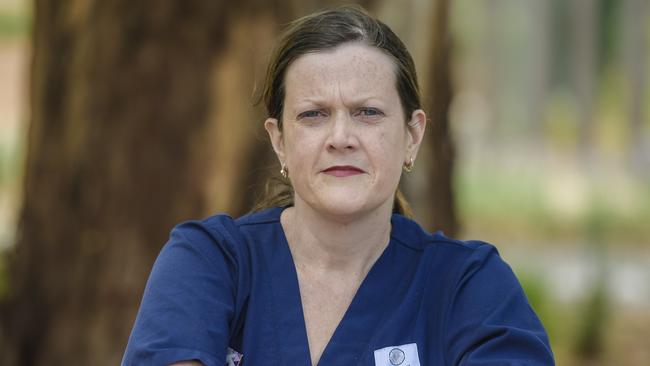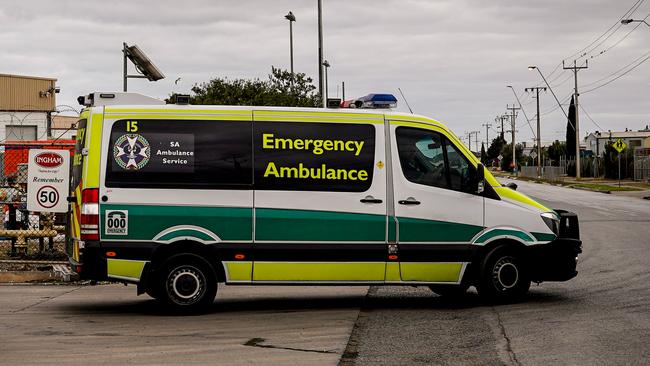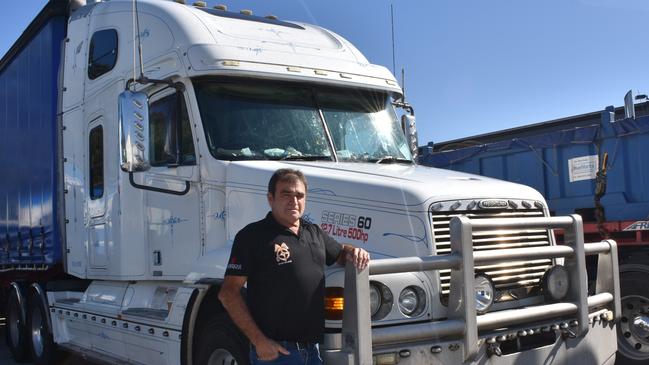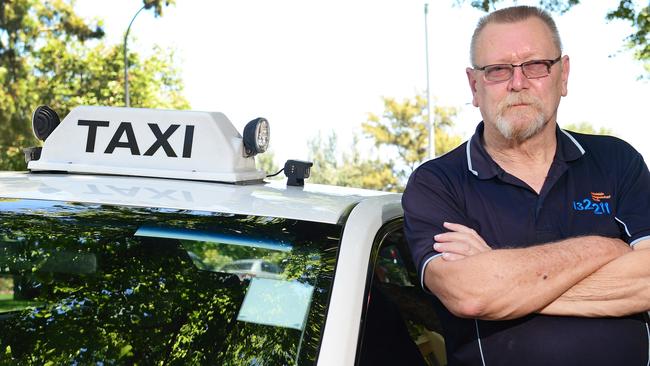Taxi drivers, nurses, truck drivers, paramedics and police share their struggles in the pandemic
South Australian workers have been wiped out of industries due to Covid-19, but some are battling on. Hear their stories as the pandemic enters its third year.
SA News
Don't miss out on the headlines from SA News. Followed categories will be added to My News.
Hundereds of workers struck down with Covid-19 or refusing to be vaccinated have left industries stretched to the limit, remaining staff say.
New rules were introduced earlier this month allowing close contacts of Covid cases working in some critical industries to return from isolation to their duties in South Australia.
But many workers and industry representatives say there are still dire staff shortages. For others, the opposite is true, as restrictions have killed demand for their services.
NURSES
Outpatient cancer care nurse Nicole, 48, who did not want her surname published, said that the strain of caring for vulnerable people while under-resourced was beginning to take its toll.
“Everyone is experiencing a real sort of pressure and stretch to what they can provide,” she said.
“Our department can’t just shut down, so we all in the team have been working short (staffed) because we have had our staff members quarantine or isolate ... it is quite stressful.”
Figures from SA Health reveal 475 workers across the state’s health networks have refused a vaccination since the requirement became mandatory on November 1. The highest number was 102 staff at the Women’s and Children’s Hospital.

Australian Nursing and Midwifery Federation SA secretary Elizabeth Dabars said Covid-19 had raised pressure on already stressed SA nurses.
“In the lead-up to the borders being reopened we raised our concerns repeatedly and we were constantly reassured that adequate provisions were in place,” she said. “(But) we constantly hear of staff working short, fatigued and a lack of breaks from personal protective equipment.”
AMBULANCE WORKERS
Ambulance dispatcher Caitlin McDonald said she felt as if she was letting the community down – but it’s not her fault.
“There is no light at the end of the tunnel. The light is getting further and further away from us. At least that’s how it feels,” she said.
The Adelaide Hills woman, 30, is alerted to jobs through a computer system, and has to work out what crew to send based on patient priority.
“It’s very challenging, especially when we’re playing with fire with the current state of resources,” she said.
Having worked as a dispatcher for two years, Ms McDonald said the situation had slowly declined, then got markedly worse when borders reopened. She said it was not uncommon for a priority-three case to wait seven hours.
“It’s absolutely heartbreaking, it’s soul-destroying, coming to work every day, feeling like we’re letting people down,” she said.

Ms McDonald works 12-hour shifts, and said there was only so much overtime she could mentally deal with.
“It’s getting harder to offer to help on a day off,” she said.
Leah Watkins from the SA Ambulance Employees Association said the impact of paramedics being off work because they had Covid or were close contacts of cases meant a “significant number” of crews could not be staffed, plus the “rationing” of those that were left.
“This has resulted in an incredibly stressful environment for those on the front line, further exacerbating the already exhausting conditions that existed prior to Covid. More than ever, crews are working 12 hours without a break. Now they do so in full PPE, in hot weather,” she said.
Ms Watkins said uni students were having to drive ambulances because the government had “squandered the opportunity to hire more staff over the past two years”.
TRUCK DRIVERS AND PUBLIC TRANSPORT WORKERS
Truck drivers should be given free, daily rapid antigen tests to protect the community from further spread of Covid-19, a driver has urged Frank Black, a subcontracting truck driver based in Albert Park, said drivers crossed paths with numerous people in a day and had potential to unintentionally spread the virus.
“At the very least everyone working in essential services should be getting them (RATs) free, and getting them urgently,” Mr Black said. “The reality is our people need to be tested every day.”
Mr Black transports goods including food, general freight and medical supplies, but said staff weren’t always interchangeable between different parts of the industry.

“It’s not as simple as plucking drivers from different sections (to cover shortages), they need to be trained,” he said. “It’s causing fatigue, some of them are being worked to the bone because of the shortage of drivers.”
Public transport workers were hit with a vaccination mandate on January 3.
Nearly 80 of Adelaide’s 1880 Adelaide Metro drivers remain unvaccinated or have not disclosed their vaccination status.
A Transport Department spokeswoman said service providers were working with affected drivers to manage their employment conditions but would not disclose whether they had been diverted to different roles.
TAXI DRIVERS
The struggling taxi industry has been further challenged by SA’s “self-imposed lockdown”, a driver says.
Phil Nunn, 66, who is an Adelaide Independent Taxis driver, said: “Bars are shut down, it’s the fear of doing something and catching Covid … there’s sort of this self-imposed lockdown.”
He said fares were often worth half what they were pre-pandemic as trips were shorter. “The industry’s probably got half the cars on the road, there’s a lack of customer demand and there’s a lack of profitability,” he said.

“What we really need is largely to open up a bit. We need to have some sign of a recovery.”
Another driver, who only provided his first name, Con, was forced off the road for a week after driving former premier Jay Weatherill while he was infectious with Covid-19.
“Because he was in the taxi for longer than 15 minutes I was considered a close contact, so I had to quarantine for a week,” Con said.
“It was frustrating … somebody’s got to pay us for our time off the road.”
POLICE OFFICERS
SA Police’s close contact, quarantining and vaccination mandate policies are “increasingly unviable and need to be reviewed”, the Police Association says.
In addition to the 200 officers off the job due to refusing to be vaccinated, hundreds remain off duty due to being positive Covid-19 cases or close contacts, Police Association president Mark Carroll said.
“At one stage this month, 329 officers were in quarantine, either as positive cases or close contacts,” he said.

The state government invested $23.6m in recruiting 114 extra protective security officers to take over medi-hotel duties and allow more police officers to get back on the beat.
But a review into the vaccination mandate was necessary, Mr Carroll said.
An SA Police spokesman said staff who chose to remain unvaccinated were required to access accrued leave or take leave without pay.




